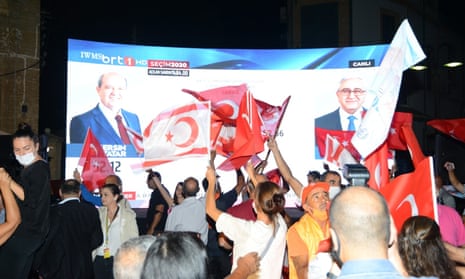A rightwing hardliner who has long advocated closer ties with Turkey has won a presidential runoff in the Turkish-occupied northern Cyprus.
Ersin Tatar, whose candidacy had been openly endorsed by Ankara, garnered 51.74% of the vote once all ballots had been counted, local media reported.
“We are the voice of Turkish Cypriots, we are fighters, we are fighting to exist within the TRNC [the Turkish Republic of northern Cyprus],” the newly elected leader said in English after his victory. “Therefore our [Greek] neighbours in the south and the international community should respect our fight to live with freedom within the TRNC.”
Incumbent president Mustafa Akinci, a moderate backed by Turkish Cypriots opposed to Turkey’s increasingly overt intervention in the territory’s domestic affairs, won 48.26% of the vote.
The 72-year-old veteran, who had pledged to push for reunification with Greek Cypriots under a federal system if re-elected for a second five-year term, wished his people luck upon conceding defeat.
“We went through an election contest that wasn’t normal,” Akinci told supporters alluding to Ankara’s meddling in the campaign. “I congratulate Tatar and those who helped bring this result … I hope these interventions don’t happen again. These results mark the end of my 45-year political career. I wish good luck to our people.”
The outcome was instantly welcomed by the Turkish foreign minister, Mevlüt Çavuşoğlu. Analysts said Tatar, aged 60 and until now prime minister in the self-declared territory, had appeared to benefit from a higher turnout in the second–round ballot.
An estimated 42% of the occupied territory’s nearly 200,000-strong electorate chose not to vote in the first round on 11 October.
Turkey, the only country to recognise the self-styled Turkish Republic of Northern Cyprus, had used its considerable leverage to get the nationalist elected. Earlier this month, in a move condemned by the UN and the EU, Turkish president Recep Tayyip Erdoğan with Tatar at his side, announced the opening of the once fabled beachfront of Varosha in the north.
The area, part of the fenced-off city of Famagusta was abandoned by Greek Cypriots when Turkish forces invaded in 1974, has been off-limits ever since and is still regarded as a key component of peace talks aimed at reuniting the island. Akinci had described the step as a “stain” on democracy.
“The outcome is a clear victory for Ankara,” said Hubert Faustmann, professor of history and political science at the University of Nicosia in the internationally recognised Greek-run south. “It is a big win for those opposed to a solution and those favouring a candidate who enjoys good relations with Turkey,” he said. “Those Turkish Cypriots who tried to re-assert themselves against the extensive meddling of Turkey in the election and those in favour of reunification of the island have lost.”
The presidential poll had been billed as pivotal for the signal it would send to the international community. Amid rising tensions over energy reserves between Turkey, Greece and Cyprus in the eastern Mediterranean, a settlement of the west’s longest-running diplomatic dispute has assumed new vitality.
UN secretary general António Guterres has announced he will call a meeting between the leaders of the island’s two feuding communities and Cyprus’s “guarantors” – Greece, Turkey and its former colonial power Britain – in a bid to reignite the stalled peace process.
Talks aimed at reuniting Greek and Turkish Cypriots in a bi-zonal, bi-communal federation collapsed at the 11th hour in Switzerland in July 2017.
Reflecting Ankara’s increasingly anti-federal stance, Tatar has also backed a two-state solution.
The Mediterranean island has been split between Greeks and Turks living on either side of an UN-patrolled ceasefire line since 1974 when Ankara invaded in response to an Athens-inspired coup aimed at uniting the island with Greece. In the course of the military operation Turkish troops seized its northern third with the statelet unilaterally proclaiming independence in 1983.
For Turkish Cypriots craving to end decades of international isolation, Akinci and his embrace of a federal solution was seen as the only way forward. His defeat will be a blow to Greek Cypriots also hoping to reunite their island. The leader, who like his Greek counterpart president, Nicos Anastasiades, was born in Limassol, belongs to a diminishing number of Cypriots who have memories of peaceful co-existence on the island.
